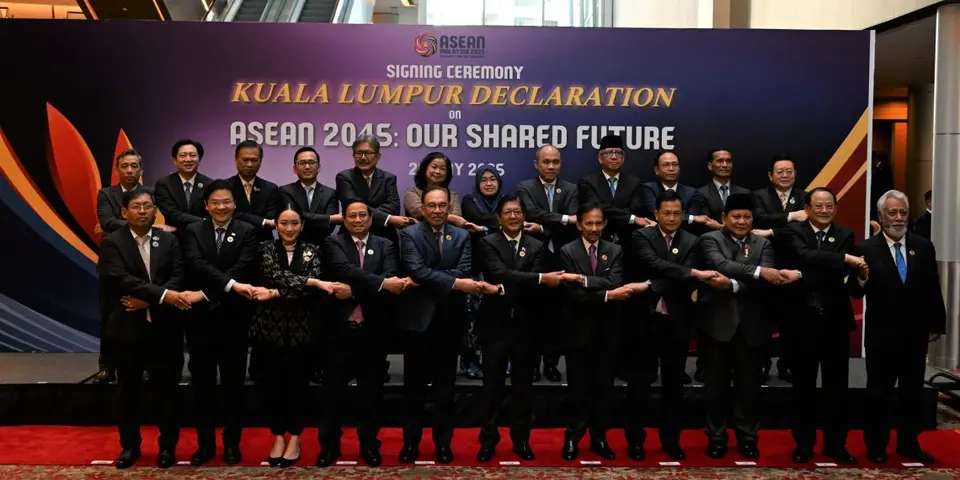
ASEAN Vision 2045 Falling Short on Human Rights and Democratic Reform, Says APHR
May 30, 2025

JAKARTA, 30 May 2025 — The ASEAN Parliamentarians for Human Rights (APHR) acknowledges the release of ASEAN Vision 2045: Our Shared Future on 27 May 2025 as a commendable effort to chart a long-term roadmap for regional integration and cooperation. While the vision eloquently affirms aspirations of unity, resilience, and shared prosperity, APHR remains deeply concerned that it insufficiently confronts the pressing human rights and democratic challenges that continue to undermine Southeast Asia’s progress today.
“This Vision aspires to chart ASEAN’s future, but it does not speak to the real and urgent concerns of the people in our region,” said Mercy Chriesty Barends, Chairperson of APHR and Member of the House of Representatives from Indonesia. “How can we plan for 2045 while ignoring the ongoing atrocities in Myanmar, the persecution of political dissidents, and the shrinking civic space across the region? A future built on silence is no future at all.”
Though the Vision reaffirms ASEAN’s foundational principles—peaceful dispute resolution, a rules-based order, and regional cooperation—it remains markedly silent on the most pressing human rights issues. The lack of clear commitments to address democratic backsliding and impunity within some member states is a missed opportunity to reinforce ASEAN’s credibility and relevance in an increasingly turbulent regional and global context.
The Vision also projects an image of unity that belies the region’s political realities. ASEAN remains a bloc of ten member states with diverging priorities, institutional asymmetries, and a deeply embedded norm of non-interference. Rather than encouraging genuine consensus, the Vision appears to prioritise elite harmony over addressing the root causes of instability, inequality, and injustice.
Moreover, the Vision fails to acknowledge one of ASEAN’s most glaring institutional gaps: the absence of any mechanism to address unconstitutional changes in government. In a region repeatedly marred by coups, military takeovers, and democratic erosion, this omission signals ASEAN’s unwillingness to hold member states accountable for violations that fundamentally undermine democratic governance. Without such a mechanism, the region’s commitment to democracy remains superficial, leaving the door open for continued political instability and authoritarian entrenchment.
“ASEAN keeps repeating the phrase ‘people-centred’—but what does that mean if the suffering of the people is absent from its most strategic document?” asked Charles Santiago, APHR Co-Chair and former Member of Parliament from Malaysia. “If we cannot name the repression, how can we address it? If we cannot protect rights, what kind of future are we building?”
Mentions of “human rights” and the ASEAN Intergovernmental Commission on Human Rights (AICHR) are tokenistic at best. The Vision offers no roadmap to enhance AICHR’s mandate, no tools for monitoring state compliance, no commitment to review and strengthen its protection functions and no mechanisms to support those most at risk. Without enforceable measures, human rights in ASEAN remain symbolic rather than substantive.
Worse still, the Vision omits the region’s most critical and immediate threats. It makes no meaningful reference to the widespread risks of atrocity crimes, the region’s worsening refugee crises, the growth of technology-facilitated trafficking, or the surge in cross-border criminal networks. Its failure to mention the plight of refugees and displaced persons is especially alarming given ASEAN’s exposure to ongoing conflicts—from Rakhine State to the Thai-Myanmar border.
“If ASEAN cannot even acknowledge the existence of the region’s displaced and persecuted populations, how can it claim to protect them?” said Rangsiman Rome, APHR Board Member and Member of the House of Representatives from Thailand. “The silence of this Vision speaks volumes—and what it says is that lives on the margins are expendable.”
The document also invokes “human security,” but the term rings hollow. While it gestures toward climate change, cyber threats, and geopolitical tension, it lacks a coherent, people-centred framework to address these issues. True human security demands confronting food insecurity, health crises, displacement, and environmental degradation with the same urgency as state security.
Most critically, the Vision lacks any meaningful accountability structure. Without transparent benchmarks, independent monitoring, and inclusive evaluation, it risks becoming another ceremonial declaration without consequence. Lofty ideals are not enough—ASEAN must commit to tangible action.
“Accountability is the foundation of legitimacy. Without it, ASEAN’s vision is not a roadmap—it’s a mirage,” said Arlene Brosas, APHR Board Member and Member of the House of Representatives from the Philippines. “If ASEAN wants to be respected globally, it must be brave enough to uphold the values it claims to stand for: justice, rights, and democratic governance.”
Unless ASEAN confronts the contradictions embedded in its architecture—its reluctance to name repression, challenge authoritarianism, or empower regional institutions—it will enter 2045 no more united or resilient than it is today. In truth, the ASEAN Vision 2045 signals business as usual: more silence, more inaction, and more tolerance of abuses that undermine the rule of law and democratic principles.
APHR urges ASEAN leaders to move beyond diplomatic theatre. If Our Shared Future is to have any meaning, it must be rooted in accountability, responsive governance, and a courageous commitment to the truth. A truly shared future can only be built by protecting the lives, rights, and voices of the people ASEAN claims to represent. #
ASEAN Parliamentarians for Human Rights (APHR) was founded in June 2013 with the objective of promoting democracy and human rights across Southeast Asia. Our founding members include many of the region's most progressive Members of Parliament (MPs), with a proven track record of human rights advocacy work.